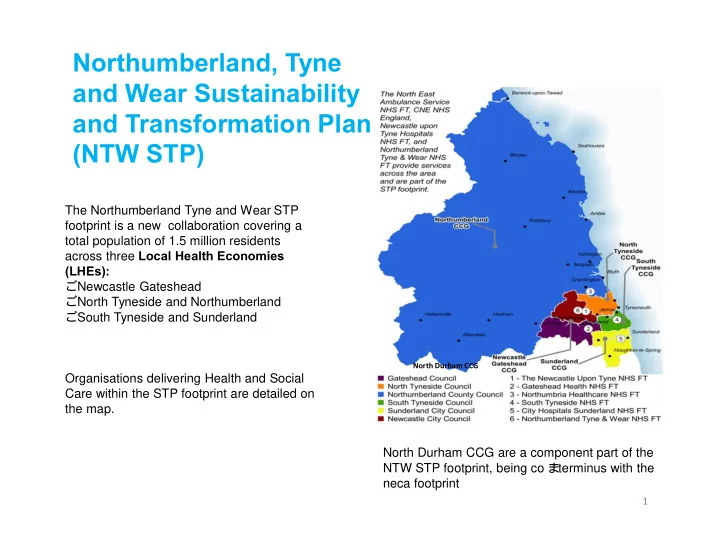

Northumberland, Tyne and Wear Sustainability and Transformation Plan (NTW STP) The Northumberland Tyne and Wear STP footprint is a new collaboration covering a total population of 1.5 million residents across three Local Health Economies (LHEs): • Newcastle Gateshead • North Tyneside and Northumberland • South Tyneside and Sunderland North Durham CCG Organisations delivering Health and Social Care within the STP footprint are detailed on the map. North Durham CCG are a component part of the NTW STP footprint, being co – terminus with the neca footprint 1
What are Sustainability & Transformation Plans? • Part of the NHS planning requirements • Designed to support the delivery the NHS 5 year forward view by 2020/21 • Planned on a bigger spatial footprint • Focused on place and population not organisation boundaries • 44 STPs nationally - transformation/evolution • Transformation and sustainability funding will be dependent on the quality of the plan • Plan submission in June 2016 – assessment and feedback in July 2016
What does the STP need to address? TRIPLE AIM Health & wellbeing The ‘ three gaps ’ Funding Care and & quality efficiency
Opportunity • Sustainability and Transformation Plans (STPs) are an opportunity to develop a route map to an improved, more sustainable, health and care system by: – Bringing organisations together to work much more closely, beyond organisation boundaries – Sharing of good practice and expertise – Identifying those areas where a single or small group of organisations would, or is, having difficulty transforming services – Identifying areas where the common agenda suggests we can do something once well rather than several times less effectively – Alignment with the work of the neca Commission for Health and Social Care Integration 4
Northumberland, Tyne and Wear STP • 5 CCG ’ s, 6 Local Authorities, 7 Foundation Trusts (including NEAS and NTW), NHS England, Public Health England • Includes North Durham CCG – co-terminus with the neca footprint • Key areas for transformation include: – Acute hospital collaboration across clinical pathways – Reconfiguration of services between acute providers – Out of hospital collaboration – Radical upgrade in prevention and wellbeing – Development of accountable care systems – Financial stability • Areas for collaborative work including system enablers: – IT, estates, workforce etc • Whole system focus – commissioners and providers across health and social care
Northumberland, Tyne and Wear STP Footprint Sustainable and Transformation Plans – large planning footprint ‘ Do once ’ Workforce/Estates Digital Technology UEC network, Cancer Alliance, Networks, Specialised services, Devolution Local Health Economies – layer of major transformation Northumberland / North South Tyneside / Newcastle and Gateshead Tyneside Sunderland Individual CCGs – layer of local integration Northumberland North South Newcastle and Gateshead Sunderland Tyneside Tyneside Federations/Communities/Neighbourhoods North Durham CCG are a component part of the NTW STP footprint, being co-terminus with the neca footprint 6
Systems efficiency and finance challenges • If we ‘ do nothing ’ we will incur a £650 million gap across health by 2020, representing 23% of total NHS allocation • £650 million represents 40% of the total North East and Cumbria £1.7 billion financial gap by 2021 • Work to date with Local Authorities indicates our joint health and social care financial gap could be as high as £960 million • Joint working continues to refine these figures with providers including LA ’ s to confirm details of provider/commissioning gaps
Governance
Next steps • The Plan is a point in time/work in progress • June 30th submission will form the basis for a “ conversation ” with NHS England and NHS Improvement throughout July • It will inform decisions about the geographical targeting of growth in the intervening years to 2020 • No formal approval or consultation from boards at this early stage • BUT need to assure NHS England and NHS Improvement that the plans reflect a shared view from STP leadership team, based upon the needs of patients and taxpayers • Engage more formally with boards and partners following the July conversations.
Recommend
More recommend